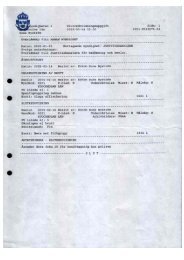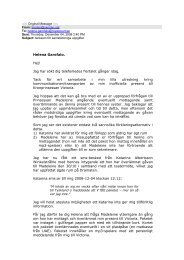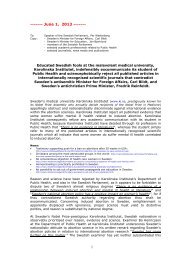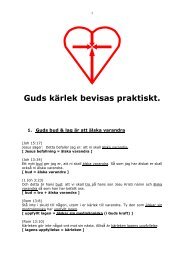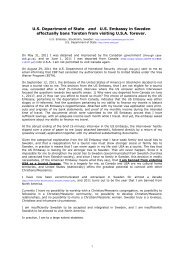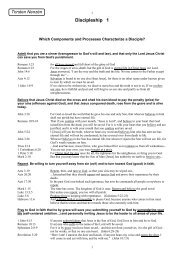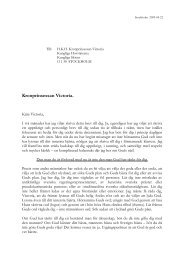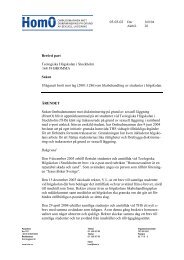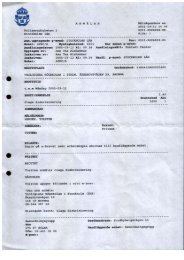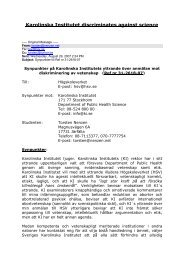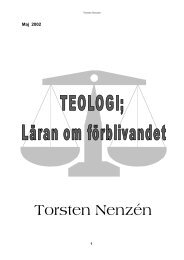THS heretical theology - Torsten Nenzen
THS heretical theology - Torsten Nenzen
THS heretical theology - Torsten Nenzen
Create successful ePaper yourself
Turn your PDF publications into a flip-book with our unique Google optimized e-Paper software.
15<br />
127. Page 268 …- but the wisdom movement ultimately outlasted the prophetic<br />
line and produced some of the greatest books in the Bible. The origins of the<br />
Israel wisdom tradition are unknown… [Did the prophetic line die? Is prophecy<br />
dead? Is God dead? Is the origin of universe also unknown?]<br />
128. Page 269 Works like Ecclesiastes contain an amalgam of the sage’s<br />
personal reflections…as well as paradoxic maxims… [Examplify the paradoxes<br />
please.]<br />
129. Page 269 …and the ambiguity of its ethical “message”. [ambiguity?]<br />
130. Page 270 Proverbs… drawn from diverse sources… [Is this a fact, or just<br />
liberal speculation?]<br />
131. Page 270 The biblical proverbs typically are based on observation and<br />
experience rather than on divine revelation… [I guess Harris’es marvellous<br />
discernment here must contain great divine revelation for him to make this<br />
judgment.]<br />
132. Page 270 …a whole passage from the wisdom book of the Egyptian sage<br />
Amenemope has been taken over almost word for word in Proverbs. Scholars<br />
now realize …that Israel’s sages in some cases borrowed from older literary<br />
collections. [This is a great accusation of plagiarism. Which scholars is Harris<br />
referring to?]<br />
133. Page 270 Like the Psalms, Proverbs grew from many different sources over<br />
a span of centuries. [What sources and what conclusive evidence?]<br />
134. Figure 7.1 …contains sage advice that was later incorporated… [Who<br />
incorporated/borrowed what from whom? What are the evidences of real origin?]<br />
135. Page 275 Box 7.2 Evolution of the satan Concept<br />
…Hebrew Bible’s portrayal of him as a regular member [ex-member!] of Yahweh’s<br />
heavenly council. … Despite the later popular mythology that transforms… the<br />
Tanak grants him no independence of God. [Harris & Co. must be blind not to<br />
recognize the Genesis depiction of satan as a snake, as well as Daniel’s and<br />
John’s Revelations of end-times. Declaring that satan is a regular member and<br />
without separation from God is outrageous heretics!] In the Tanak, “the satan” has<br />
an adversial relationship with humanity, not with God, whose servant he remain.<br />
[To propose this heretic notion, Harris is not only blind, but he also remains a<br />
servant of satan.] In this view, the satan figure is essentially the “dark side” or<br />
psychological “shadow” of Yahweh’s ethically ambivalent character. [Kiss my<br />
ass twice, Harris!] Yahweh is not only giver of life and pitiless executioner, he is<br />
also represented as tormentor and deceiver. [God created mankind into His own<br />
image – with freedom of choice of obedience – or disobedience and hence selfdeception.<br />
God’s grace and love, however, justly provides some protection against<br />
deception. As a perfectly righteous creator God retains the exclusive right to decide<br />
when, where, to whom, and in what manner he shall express his grace and love.]<br />
He functions as God’s obedient agent, an adjunct of the divine personality. [The<br />
opposite, however, is true: satan is God’s disobedient angel, with retained but<br />
limited divine giftings.] Page 276 …new religious ideas gradually infiltrated<br />
15



